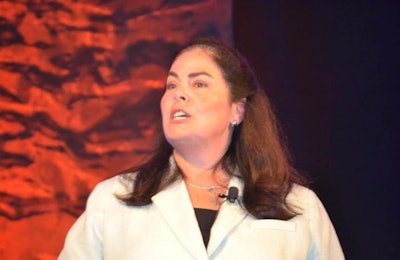
As the U.S. population is becoming increasingly more focused on health, the trend is having a meaningful impact on the meat case and poultry consumption behavior.
Speaking at the 2017 Chicken Marketing Summit in Asheville, North Carolina, Elizabeth Ehrhardt, IRI principal, client insights, said health care is “the biggest trend that we are facing.” But the ways that people are focusing on their health are changing. Healthy eating, or perceived healthy eating, is more mainstream now than ever.
"People are looking beyond just the doctor's visit to work on how they can treat what ails them."
“As health becomes more and more important, and as healthcare becomes more and more expensive, consumers are looking for new ways to keep themselves healthy,” Ehrhardt said. “People are looking beyond just the doctor’s visit to work on how they can treat what ails them, and even more importantly, prevent serious health issues from occurring.”
According to Ehrhardt, 37 percent of consumers say food is just as powerful as medication when it comes to maintaining their health and well-being. Therefore, it makes sense that consumers are looking for food that they believe is better for them.
Tracking healthy purchases
IRI is a firm that provides data, analytics and insights based on retail purchases. Ehrhardt said when purchases are made at major retailers, information from billions of transactions is entered into databases to track consumer trends.
Through those purchases, IRI has been able to track how chicken and other protein products deemed as healthy are being bought and consumed more than before.
She noted “the protein trend is hot,” and that trend does not appear to be changing in the near future.
Antibiotic-free, organic chicken purchases growing
As consumers increasingly seek protein products, and specifically ones they view as better for people’s health, antibiotic-free (ABF) and organic products have resonated with people as healthier.
The chicken industry is leading the transition to raising animals without antibiotics. The sector represents a larger percentage of ABF product purchases than any other meat, followed by turkey, beef and pork. The same is true when it comes to products labeled as organic.
According to Ehrhardt, chicken raised without antibiotics accounted for 15 percent of all chicken sales in the United States in 2016, and that percentage is expected to rise to 40 percent by 2022.
Labels make a difference
Shoppers pay attention to labels. However, the labels need to mean something.
Ehrhardt said ingredient labels are important to shoppers. They want to know not only what is in the food they are purchasing; but also what is not in it.
Certification labels are also meaningful. According to Ehrhardt, 30 percent of consumers find animal certifications either important or extremely important, and many 50 percent said they are willing to pay a premium for foods raised according to a certification criteria. This presents an opportunity for the poultry and meat industries, as only 12 percent of animals raised for food consumption are covered by certification programs.
Retailers must respond to demand
As consumers view the food they eat as an increasing part of their overall health and wellness plan, they also view the retailers where they purchase their foods as partners in achieving and maintaining good health, Ehrhardt said.
“Retail has to respond. The retailers that are performing best are the ones that are supporting consumers in their need for greater health and wellness,” she said.
Recent IRI data shows stores carrying more ABF and organic poultry products, and stores with a reputation for carrying more ABF and organic products, are outperforming the general market significantly.
“This matters,” she said. "Consumers notice. Consumers purchase.”
However, it isn’t just what they carry. It is also the stores finding ways to help consumers with their health ambitions other than through the foods they sell.
Retailers who offer interactive store sites, websites with health information, nutrition classes and in-store nutritionists resonate strongly with the health-conscious consumer, Ehrhardt said.
















